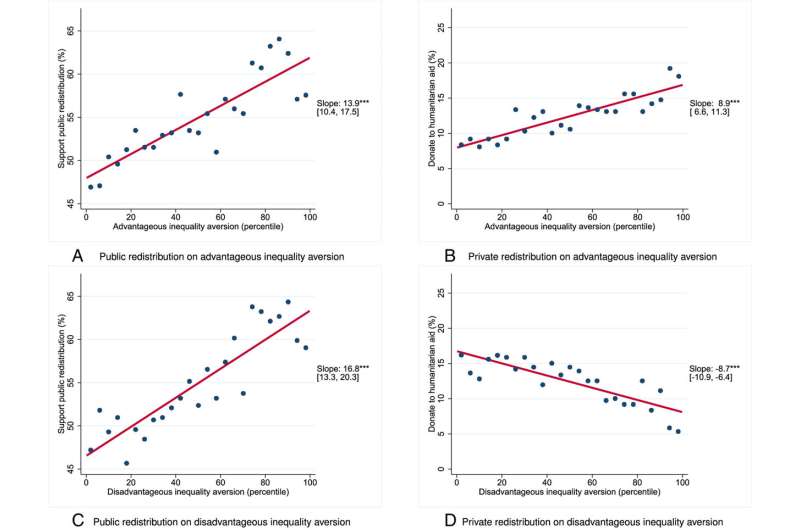As income inequality widens, debates around redistribution policies are heating up. New research from the Universities of Zurich, Lille and Copenhagen reveals that support for these policies stems not only from individuals’ financial situations but also from an inherent aversion to inequality.
This finding, published in an article in the Proceedings of the National Academy of Sciences, offers valuable insights into predicting public support for future redistribution policies.
Traditional economic theories assume that individuals only care about their own income when it comes to supporting redistribution policies. However, an international team of researchers from the University of Zurich (UZH), the University of Lille and the University of Copenhagen now challenges this view.
The results of their study show that people’s preferences towards inequality per se play a major role. “By taking into account how much people dislike inequality, we can better predict who will support policies aimed at reducing the income gap,” says Ernst Fehr, corresponding author and director of the UBS Center for Economics in Society at the Department of Economics at UZH.
Attitudes towards inequality vary
People’s aversion to inequality comes in two forms: While some dislike being worse off than others, known as “disadvantageous inequality aversion,” others dislike the existence of poorer individuals, termed “advantageous inequality aversion.” These attitudes vary widely among people, and the understanding of how these preferences shape political support for redistribution policies remains limited.
In the study involving roughly 9,000 Danish participants aged 20 to 64, the researchers measured individuals’ aversion to inequality with a behavioral experiment.
They then linked the results to individuals’ support for politically enforced income redistribution, i.e., policies that reduce income differences, and for charitable giving through documented real-life charitable donations that reveal their private redistribution preferences.
Inequality aversion influences support for redistribution
“Our empirical results show that people who have a stronger dislike of both advantageous and disadvantageous inequality are more likely to support political redistribution,” says Fehr.
However, when it comes to charitable giving, those with a stronger dislike of advantageous inequality are more generous while those with a stronger aversion for disadvantageous inequality are less generous.
“Our findings support the theory of inequality aversion which suggests that many people dislike inequality per se, and that this dislike has important economic and political consequences—both at the societal and the personal level,” Ernst Fehr concludes.
More information:
Thomas F. Epper et al, Inequality aversion predicts support for public and private redistribution, Proceedings of the National Academy of Sciences (2024). DOI: 10.1073/pnas.2401445121
Provided by
University of Zurich
Citation:
Aversion to inequality drives support for redistribution policies, study finds (2024, September 19)
retrieved 19 September 2024
from https://phys.org/news/2024-09-aversion-inequality-redistribution-policies.html
This document is subject to copyright. Apart from any fair dealing for the purpose of private study or research, no
part may be reproduced without the written permission. The content is provided for information purposes only.

